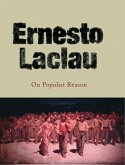David Bollier (Director, Reinventing the Commons Program, Schumache, Silke Helfrich
Free, Fair, and Alive
The Insurgent Power of the Commons
David Bollier (Director, Reinventing the Commons Program, Schumache, Silke Helfrich
Free, Fair, and Alive
The Insurgent Power of the Commons
- Broschiertes Buch
- Merkliste
- Auf die Merkliste
- Bewerten Bewerten
- Teilen
- Produkt teilen
- Produkterinnerung
- Produkterinnerung
Free, Fair, and Alive is a penetrating cultural critique, table-pounding political treatise, and practical playbook for "commoning" â free, self-organizing systems ranging from alternative currencies to open-source everything. It presents a bold and compelling alternative to the dead-end, predatory market-state system.
Andere Kunden interessierten sich auch für
![Imagine a Country: Ideas for a Better Future Imagine a Country: Ideas for a Better Future]() Imagine a Country: Ideas for a Better Future18,99 €
Imagine a Country: Ideas for a Better Future18,99 €![Tiny House Design & Construction Guide: Your Guide to Building a Mortgage Free, Environmentally Sustainable Home Tiny House Design & Construction Guide: Your Guide to Building a Mortgage Free, Environmentally Sustainable Home]() Dan LoucheTiny House Design & Construction Guide: Your Guide to Building a Mortgage Free, Environmentally Sustainable Home20,99 €
Dan LoucheTiny House Design & Construction Guide: Your Guide to Building a Mortgage Free, Environmentally Sustainable Home20,99 €![On Populist Reason On Populist Reason]() Ernesto LaclauOn Populist Reason21,99 €
Ernesto LaclauOn Populist Reason21,99 €![Weak Strongman Weak Strongman]() Timothy FryeWeak Strongman40,99 €
Timothy FryeWeak Strongman40,99 €![How Capitalism Underdeveloped Black America How Capitalism Underdeveloped Black America]() Manning MarableHow Capitalism Underdeveloped Black America28,99 €
Manning MarableHow Capitalism Underdeveloped Black America28,99 €![Weak Strongman Weak Strongman]() Timothy FryeWeak Strongman22,99 €
Timothy FryeWeak Strongman22,99 €![The Prince The Prince]() Niccolo MachiavelliThe Prince8,99 €
Niccolo MachiavelliThe Prince8,99 €-
-
-
Free, Fair, and Alive is a penetrating cultural critique, table-pounding political treatise, and practical playbook for "commoning" â free, self-organizing systems ranging from alternative currencies to open-source everything. It presents a bold and compelling alternative to the dead-end, predatory market-state system.
Hinweis: Dieser Artikel kann nur an eine deutsche Lieferadresse ausgeliefert werden.
Hinweis: Dieser Artikel kann nur an eine deutsche Lieferadresse ausgeliefert werden.
Produktdetails
- Produktdetails
- Verlag: New Society Publishers
- Seitenzahl: 448
- Erscheinungstermin: 3. September 2019
- Englisch
- Abmessung: 228mm x 153mm x 30mm
- Gewicht: 688g
- ISBN-13: 9780865719217
- ISBN-10: 0865719217
- Artikelnr.: 55431916
- Herstellerkennzeichnung
- Libri GmbH
- Europaallee 1
- 36244 Bad Hersfeld
- gpsr@libri.de
- Verlag: New Society Publishers
- Seitenzahl: 448
- Erscheinungstermin: 3. September 2019
- Englisch
- Abmessung: 228mm x 153mm x 30mm
- Gewicht: 688g
- ISBN-13: 9780865719217
- ISBN-10: 0865719217
- Artikelnr.: 55431916
- Herstellerkennzeichnung
- Libri GmbH
- Europaallee 1
- 36244 Bad Hersfeld
- gpsr@libri.de
David Bollier is an activist, scholar, and blogger who is focused on the commons as a new/old paradigm for re-imagining economics, politics, and culture. He pursues his commons scholarship and activism as Director of the Reinventing the Commons Program at the Schumacher Center for a New Economics and as cofounder of the Commons Strategies Group, an international advocacy project. Author of Think Like a Commoner and other books, he blogs at www.Bollier.org, and lives in Amherst, MA. Silke Helfrich is an independent activist, author, scholar, and speaker. She cofounded the Commons Strategies Group and Commons-Institute, was former head of the regional office of Heinrich Böll Foundation for Central America, Cuba, and Mexico, and holds degrees in Romance languages/pedagogy and in social sciences. Helfrich is the editor and co-author of several books on the Commons, and she blogs at www.commons.blog. She lives in Neudenau, Germany.
Introduction
Part I: The Commons as a Transformative Perspective
1. Commons and Commoning
Commoning is Everywhere, but Widely Misunderstood
What Island Is Not a Commons
Commons in Real Life
Zaatari Refugee Camp
Buurtzorg Nederland
WikiHouse
Community Supported Agriculture
Guifi.net
Understanding Commons Holistically in the Wild
2. The OntoShift to the Commons
The Window Through Which We See the World
The OntoStory of the Modern West
OntoStories as a Hidden Deep Dimension of Politics
The Nested-I and Ubuntu Rationality: The Relational Ontology of the Commons
Complexity Science and Commoning
Making an OntoShift to the Commons
3. Language and the Creation of Commons
Words, Terms, and Categories
The Tenacity of Systems of Opinion; The Harmonyof Illusions
Language and World-Making
Frames, Metaphors, and the Terms of Our Cognition
Language Evokes and Sustains a Worldview
Keywords from a Fading Era
Misleading Binaries
How Commoning Moves Beyond the Open/Closed Binary
Glossary of Commons-Friendly Terms
Part II: The Triad of Commoning
Introduction
Principles and Patterns
A Word on Methodology
4. The Social Life of Commoning
Cultivate Shared Purpose & Values
Ritualize Togetherness
Contribute Freely
Practice Gentle Reciprocity
Trust Situated Knowing
Deepen Communion with Nature
Preserve Relationships in Addressing Conflicts
Reflect on Your Peer Governance
5. Peer Governance Through Commoning
A Few Words About Governance
Patterns of Peer Governance
Bring Diversity into Shared Purpose
On the Origins of Peer Governance
Create Semi-permeable Membranes
Honor Transparency in a Sphere of Trust
Share Knowledge Generously
Assure Consent in Decision Making
Sociocracy and Consent-Based Decision Making
Rely on Heterarchy
Peer Monitor & Apply Graduated Sanctions
Relationalize Property
Keep Commons & Commerce Distinct
Enclosures as a Threat to Commons
Finance Commons Provisioning
6. Provisioning Through Commons
Make & Use Together
Support Care & Decommodified Work
Share the Risks of Provisioning
Contribute & Share
Varieties of Allocation in a Commons
Pool, Cap & Divide Up
Pool, Cap & Mutualize
Trade with Price Sovereignty
Cecosesola, or How to Ignore the Market
Use Convivial Tools
Rely on Distributed Structures
Creatively Adapt & Renew
Part III: Growing the Commonsverse
Introduction
7. Rethinking Property
Me, My Freedom, and My Property
Property is Relational
Collective Property as a Counterpoint to Individual Property?
Possession is Distinct From Property
Custom as Vernacular Law
Inalienability: A Crucial Concept for Commoning
Rediscovering the Power of Res Nullius
Property and the Objectification of Social Relations
8. Relationalize Property
Decommodifying a Supermarket
Why Relationalize Property?
A Platform Designed for Collaboration: Federated Wiki
Neutralizing Capital in the Housing Market: The Mietshäuser Syndikat Story
Hacking Property to Help Build Commons
Platform Cooperatives
Open Source Seeds
Commoning Mushrooms: The Iriaiken Philosophy
Building Stronger Commons Through Relationalized Property
Re-Introducing Meaning Making into Modern Law
9. State Power and Commoning
"The State" and "The People"
Equal Under Law, Unequal in Reality
Some Working Notes on State Power
Beyond Reform or Revolution
The Power of Commoning
Revamping State Power to Support Commoning
Catalyze & Propagate
Establish Commons at the Macroscale
Provide Infrastructures for Commoning
Create New Types of Finance for the Commons
Commons and Subsidiarity
What about Fundamental Rights Guaranteed by the State?
10. Take Commoning to Scale
Charters for Commoning
Distributed Ledgers as a Platform for Commoning
A Brief Explanation of Hash and Hashchain, Blockchain, and Holochain
Commons-Public Partnerships
Commoning at Scale
Acknowledgments
Appendix A: Notes on the Methodology Used for Identifying Patterns of
Commoning
Appendix B: Visual Grammar for the Pattern Illustrations
Appendix C: Commons and Commoning Tools Mentioned in This Book
Appendix D: Elinor Ostrom's Eight Design Principles for Successful Commons
and Commoning Tools
Notes
Index
About the Authors
A Note About the Publisher
Part I: The Commons as a Transformative Perspective
1. Commons and Commoning
Commoning is Everywhere, but Widely Misunderstood
What Island Is Not a Commons
Commons in Real Life
Zaatari Refugee Camp
Buurtzorg Nederland
WikiHouse
Community Supported Agriculture
Guifi.net
Understanding Commons Holistically in the Wild
2. The OntoShift to the Commons
The Window Through Which We See the World
The OntoStory of the Modern West
OntoStories as a Hidden Deep Dimension of Politics
The Nested-I and Ubuntu Rationality: The Relational Ontology of the Commons
Complexity Science and Commoning
Making an OntoShift to the Commons
3. Language and the Creation of Commons
Words, Terms, and Categories
The Tenacity of Systems of Opinion; The Harmonyof Illusions
Language and World-Making
Frames, Metaphors, and the Terms of Our Cognition
Language Evokes and Sustains a Worldview
Keywords from a Fading Era
Misleading Binaries
How Commoning Moves Beyond the Open/Closed Binary
Glossary of Commons-Friendly Terms
Part II: The Triad of Commoning
Introduction
Principles and Patterns
A Word on Methodology
4. The Social Life of Commoning
Cultivate Shared Purpose & Values
Ritualize Togetherness
Contribute Freely
Practice Gentle Reciprocity
Trust Situated Knowing
Deepen Communion with Nature
Preserve Relationships in Addressing Conflicts
Reflect on Your Peer Governance
5. Peer Governance Through Commoning
A Few Words About Governance
Patterns of Peer Governance
Bring Diversity into Shared Purpose
On the Origins of Peer Governance
Create Semi-permeable Membranes
Honor Transparency in a Sphere of Trust
Share Knowledge Generously
Assure Consent in Decision Making
Sociocracy and Consent-Based Decision Making
Rely on Heterarchy
Peer Monitor & Apply Graduated Sanctions
Relationalize Property
Keep Commons & Commerce Distinct
Enclosures as a Threat to Commons
Finance Commons Provisioning
6. Provisioning Through Commons
Make & Use Together
Support Care & Decommodified Work
Share the Risks of Provisioning
Contribute & Share
Varieties of Allocation in a Commons
Pool, Cap & Divide Up
Pool, Cap & Mutualize
Trade with Price Sovereignty
Cecosesola, or How to Ignore the Market
Use Convivial Tools
Rely on Distributed Structures
Creatively Adapt & Renew
Part III: Growing the Commonsverse
Introduction
7. Rethinking Property
Me, My Freedom, and My Property
Property is Relational
Collective Property as a Counterpoint to Individual Property?
Possession is Distinct From Property
Custom as Vernacular Law
Inalienability: A Crucial Concept for Commoning
Rediscovering the Power of Res Nullius
Property and the Objectification of Social Relations
8. Relationalize Property
Decommodifying a Supermarket
Why Relationalize Property?
A Platform Designed for Collaboration: Federated Wiki
Neutralizing Capital in the Housing Market: The Mietshäuser Syndikat Story
Hacking Property to Help Build Commons
Platform Cooperatives
Open Source Seeds
Commoning Mushrooms: The Iriaiken Philosophy
Building Stronger Commons Through Relationalized Property
Re-Introducing Meaning Making into Modern Law
9. State Power and Commoning
"The State" and "The People"
Equal Under Law, Unequal in Reality
Some Working Notes on State Power
Beyond Reform or Revolution
The Power of Commoning
Revamping State Power to Support Commoning
Catalyze & Propagate
Establish Commons at the Macroscale
Provide Infrastructures for Commoning
Create New Types of Finance for the Commons
Commons and Subsidiarity
What about Fundamental Rights Guaranteed by the State?
10. Take Commoning to Scale
Charters for Commoning
Distributed Ledgers as a Platform for Commoning
A Brief Explanation of Hash and Hashchain, Blockchain, and Holochain
Commons-Public Partnerships
Commoning at Scale
Acknowledgments
Appendix A: Notes on the Methodology Used for Identifying Patterns of
Commoning
Appendix B: Visual Grammar for the Pattern Illustrations
Appendix C: Commons and Commoning Tools Mentioned in This Book
Appendix D: Elinor Ostrom's Eight Design Principles for Successful Commons
and Commoning Tools
Notes
Index
About the Authors
A Note About the Publisher
Introduction
Part I: The Commons as a Transformative Perspective
1. Commons and Commoning
Commoning is Everywhere, but Widely Misunderstood
What Island Is Not a Commons
Commons in Real Life
Zaatari Refugee Camp
Buurtzorg Nederland
WikiHouse
Community Supported Agriculture
Guifi.net
Understanding Commons Holistically in the Wild
2. The OntoShift to the Commons
The Window Through Which We See the World
The OntoStory of the Modern West
OntoStories as a Hidden Deep Dimension of Politics
The Nested-I and Ubuntu Rationality: The Relational Ontology of the Commons
Complexity Science and Commoning
Making an OntoShift to the Commons
3. Language and the Creation of Commons
Words, Terms, and Categories
The Tenacity of Systems of Opinion; The Harmonyof Illusions
Language and World-Making
Frames, Metaphors, and the Terms of Our Cognition
Language Evokes and Sustains a Worldview
Keywords from a Fading Era
Misleading Binaries
How Commoning Moves Beyond the Open/Closed Binary
Glossary of Commons-Friendly Terms
Part II: The Triad of Commoning
Introduction
Principles and Patterns
A Word on Methodology
4. The Social Life of Commoning
Cultivate Shared Purpose & Values
Ritualize Togetherness
Contribute Freely
Practice Gentle Reciprocity
Trust Situated Knowing
Deepen Communion with Nature
Preserve Relationships in Addressing Conflicts
Reflect on Your Peer Governance
5. Peer Governance Through Commoning
A Few Words About Governance
Patterns of Peer Governance
Bring Diversity into Shared Purpose
On the Origins of Peer Governance
Create Semi-permeable Membranes
Honor Transparency in a Sphere of Trust
Share Knowledge Generously
Assure Consent in Decision Making
Sociocracy and Consent-Based Decision Making
Rely on Heterarchy
Peer Monitor & Apply Graduated Sanctions
Relationalize Property
Keep Commons & Commerce Distinct
Enclosures as a Threat to Commons
Finance Commons Provisioning
6. Provisioning Through Commons
Make & Use Together
Support Care & Decommodified Work
Share the Risks of Provisioning
Contribute & Share
Varieties of Allocation in a Commons
Pool, Cap & Divide Up
Pool, Cap & Mutualize
Trade with Price Sovereignty
Cecosesola, or How to Ignore the Market
Use Convivial Tools
Rely on Distributed Structures
Creatively Adapt & Renew
Part III: Growing the Commonsverse
Introduction
7. Rethinking Property
Me, My Freedom, and My Property
Property is Relational
Collective Property as a Counterpoint to Individual Property?
Possession is Distinct From Property
Custom as Vernacular Law
Inalienability: A Crucial Concept for Commoning
Rediscovering the Power of Res Nullius
Property and the Objectification of Social Relations
8. Relationalize Property
Decommodifying a Supermarket
Why Relationalize Property?
A Platform Designed for Collaboration: Federated Wiki
Neutralizing Capital in the Housing Market: The Mietshäuser Syndikat Story
Hacking Property to Help Build Commons
Platform Cooperatives
Open Source Seeds
Commoning Mushrooms: The Iriaiken Philosophy
Building Stronger Commons Through Relationalized Property
Re-Introducing Meaning Making into Modern Law
9. State Power and Commoning
"The State" and "The People"
Equal Under Law, Unequal in Reality
Some Working Notes on State Power
Beyond Reform or Revolution
The Power of Commoning
Revamping State Power to Support Commoning
Catalyze & Propagate
Establish Commons at the Macroscale
Provide Infrastructures for Commoning
Create New Types of Finance for the Commons
Commons and Subsidiarity
What about Fundamental Rights Guaranteed by the State?
10. Take Commoning to Scale
Charters for Commoning
Distributed Ledgers as a Platform for Commoning
A Brief Explanation of Hash and Hashchain, Blockchain, and Holochain
Commons-Public Partnerships
Commoning at Scale
Acknowledgments
Appendix A: Notes on the Methodology Used for Identifying Patterns of
Commoning
Appendix B: Visual Grammar for the Pattern Illustrations
Appendix C: Commons and Commoning Tools Mentioned in This Book
Appendix D: Elinor Ostrom's Eight Design Principles for Successful Commons
and Commoning Tools
Notes
Index
About the Authors
A Note About the Publisher
Part I: The Commons as a Transformative Perspective
1. Commons and Commoning
Commoning is Everywhere, but Widely Misunderstood
What Island Is Not a Commons
Commons in Real Life
Zaatari Refugee Camp
Buurtzorg Nederland
WikiHouse
Community Supported Agriculture
Guifi.net
Understanding Commons Holistically in the Wild
2. The OntoShift to the Commons
The Window Through Which We See the World
The OntoStory of the Modern West
OntoStories as a Hidden Deep Dimension of Politics
The Nested-I and Ubuntu Rationality: The Relational Ontology of the Commons
Complexity Science and Commoning
Making an OntoShift to the Commons
3. Language and the Creation of Commons
Words, Terms, and Categories
The Tenacity of Systems of Opinion; The Harmonyof Illusions
Language and World-Making
Frames, Metaphors, and the Terms of Our Cognition
Language Evokes and Sustains a Worldview
Keywords from a Fading Era
Misleading Binaries
How Commoning Moves Beyond the Open/Closed Binary
Glossary of Commons-Friendly Terms
Part II: The Triad of Commoning
Introduction
Principles and Patterns
A Word on Methodology
4. The Social Life of Commoning
Cultivate Shared Purpose & Values
Ritualize Togetherness
Contribute Freely
Practice Gentle Reciprocity
Trust Situated Knowing
Deepen Communion with Nature
Preserve Relationships in Addressing Conflicts
Reflect on Your Peer Governance
5. Peer Governance Through Commoning
A Few Words About Governance
Patterns of Peer Governance
Bring Diversity into Shared Purpose
On the Origins of Peer Governance
Create Semi-permeable Membranes
Honor Transparency in a Sphere of Trust
Share Knowledge Generously
Assure Consent in Decision Making
Sociocracy and Consent-Based Decision Making
Rely on Heterarchy
Peer Monitor & Apply Graduated Sanctions
Relationalize Property
Keep Commons & Commerce Distinct
Enclosures as a Threat to Commons
Finance Commons Provisioning
6. Provisioning Through Commons
Make & Use Together
Support Care & Decommodified Work
Share the Risks of Provisioning
Contribute & Share
Varieties of Allocation in a Commons
Pool, Cap & Divide Up
Pool, Cap & Mutualize
Trade with Price Sovereignty
Cecosesola, or How to Ignore the Market
Use Convivial Tools
Rely on Distributed Structures
Creatively Adapt & Renew
Part III: Growing the Commonsverse
Introduction
7. Rethinking Property
Me, My Freedom, and My Property
Property is Relational
Collective Property as a Counterpoint to Individual Property?
Possession is Distinct From Property
Custom as Vernacular Law
Inalienability: A Crucial Concept for Commoning
Rediscovering the Power of Res Nullius
Property and the Objectification of Social Relations
8. Relationalize Property
Decommodifying a Supermarket
Why Relationalize Property?
A Platform Designed for Collaboration: Federated Wiki
Neutralizing Capital in the Housing Market: The Mietshäuser Syndikat Story
Hacking Property to Help Build Commons
Platform Cooperatives
Open Source Seeds
Commoning Mushrooms: The Iriaiken Philosophy
Building Stronger Commons Through Relationalized Property
Re-Introducing Meaning Making into Modern Law
9. State Power and Commoning
"The State" and "The People"
Equal Under Law, Unequal in Reality
Some Working Notes on State Power
Beyond Reform or Revolution
The Power of Commoning
Revamping State Power to Support Commoning
Catalyze & Propagate
Establish Commons at the Macroscale
Provide Infrastructures for Commoning
Create New Types of Finance for the Commons
Commons and Subsidiarity
What about Fundamental Rights Guaranteed by the State?
10. Take Commoning to Scale
Charters for Commoning
Distributed Ledgers as a Platform for Commoning
A Brief Explanation of Hash and Hashchain, Blockchain, and Holochain
Commons-Public Partnerships
Commoning at Scale
Acknowledgments
Appendix A: Notes on the Methodology Used for Identifying Patterns of
Commoning
Appendix B: Visual Grammar for the Pattern Illustrations
Appendix C: Commons and Commoning Tools Mentioned in This Book
Appendix D: Elinor Ostrom's Eight Design Principles for Successful Commons
and Commoning Tools
Notes
Index
About the Authors
A Note About the Publisher








